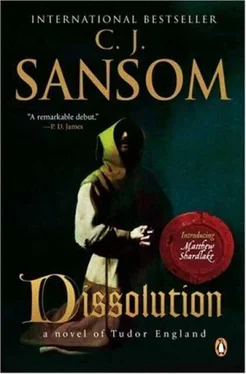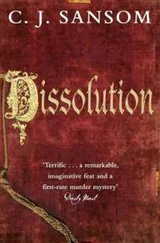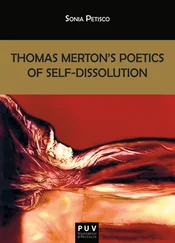C. Sansom - Dissolution
Здесь есть возможность читать онлайн «C. Sansom - Dissolution» весь текст электронной книги совершенно бесплатно (целиком полную версию без сокращений). В некоторых случаях можно слушать аудио, скачать через торрент в формате fb2 и присутствует краткое содержание. Жанр: Исторический детектив, на английском языке. Описание произведения, (предисловие) а так же отзывы посетителей доступны на портале библиотеки ЛибКат.
- Название:Dissolution
- Автор:
- Жанр:
- Год:неизвестен
- ISBN:нет данных
- Рейтинг книги:5 / 5. Голосов: 1
-
Избранное:Добавить в избранное
- Отзывы:
-
Ваша оценка:
- 100
- 1
- 2
- 3
- 4
- 5
Dissolution: краткое содержание, описание и аннотация
Предлагаем к чтению аннотацию, описание, краткое содержание или предисловие (зависит от того, что написал сам автор книги «Dissolution»). Если вы не нашли необходимую информацию о книге — напишите в комментариях, мы постараемся отыскать её.
Dissolution — читать онлайн бесплатно полную книгу (весь текст) целиком
Ниже представлен текст книги, разбитый по страницам. Система сохранения места последней прочитанной страницы, позволяет с удобством читать онлайн бесплатно книгу «Dissolution», без необходимости каждый раз заново искать на чём Вы остановились. Поставьте закладку, и сможете в любой момент перейти на страницу, на которой закончили чтение.
Интервал:
Закладка:
'These men of accounts always believe that what is cheapest is best,' I continued philosophically, 'and prink and save till all falls about them.'
'Brother Edwig thinks saving money is a holy duty,' he said bitterly.
'Neither he nor the prior appear much given to charity.'
He gave me a sharp look, but said nothing more as he led me from the church.
Outside, my eyes watered in the cold white light. The sun was high now and gave brightness if not warmth. More paths had been cleared through the snow and people were going about their business again, black habits criss-crossing the white expanse.
The library building, next to the church, was surprisingly large. Light streamed in from high windows, illuminating shelves crammed with books. The desks were empty, save for a novice scratching his head over a heavy tome, and an old monk in a corner laboriously copying a manuscript.
'Not many at study,' I observed.
'The library is often empty,' Brother Gabriel said regretfully. 'If someone has to consult a book, he usually takes it to his cell.' He went over to the old monk. 'How are you progressing, Stephen?'
The old man squinted up at us. 'Slowly, Brother Gabriel.' I glanced at his work; he was copying an early bible, the letters and the painted figures beside the text worked in intricate detail, the colours standing out brightly on the thick parchment, only slightly faded after centuries. The monk's copy, though, was a poor affair, the letters scratchy and uneven, the colours gaudy. Brother Gabriel patted him on the shoulder. 'Nec aspera terrent, Brother,' he said, before turning to me. 'I will show you the illustration of Barabbas's hand.'
The sacrist led me up winding stairs to the upper floor. Here were more books, innumerable shelves stacked with ancient volumes. Thick dust lay everywhere.
'Our collection. Some of our books are copies of Greek and Roman works made in the days when copying was an art. Even fifty years ago those desks downstairs would have been filled with brothers copying books. But since printing came in no one wants illustrated works, they are happy with these cheap books with their ugly, square letters all squashed together.'
'Printed books may be less beautiful, but now God's word can be brought to all.'
'But can it be understood by all?' he replied with animation. 'And without illustration and art to stimulate our awe and reverence?' He took an old volume from the shelves and opened it, coughing amidst the dust it raised. Little painted creatures danced impishly among lines of Greek text.
'Reputedly a copy of Aristotle's lost work On Comedy,' he said. 'A fake, of course, thirteenth-century Italian, but beautiful nonetheless.' He closed it, turning to an enormous volume that shared a shelf with a number of rolled-up plans. He pulled them out and I took one to assist him. I was surprised when he grabbed it back.
'No! Don't take it!'
I raised my eyebrows. His face reddened.
'I am sorry – I – I would not have you get dust on your clothes, sir.'
'What are those?'
'Old plans of the monastery. The mason consults them sometimes.' He withdrew the volume beneath. It was so large he had difficulty in heaving it over to a desk. He turned the pages carefully.
'This is an illustrated history of the monastery's treasures, set down two hundred years ago.' I saw coloured pictures of the statues I had seen in the church, and other items like the lectern in the refectory, each drawing annotated with measurements and a Latin commentary. The centre pages were taken up with a coloured illustration of a large square casket set with jewels. Inside a glass panel, on a purple cushion, lay a piece of dark wood. A human hand was fixed there by a broad-headed nail driven through the palm; withered and ancient, every sinew and tendon visible. From the measurements the box was two feet square and a foot deep.
'So those are the emeralds,' I said. 'They are large. The casket could have been stolen for its precious jewels and gold?'
'Yes. Though any Christian doing such a thing would lose their immortal soul.'
'I always thought the thieves crucified with Christ had their hands tied to the cross rather than being nailed to it, so that their suffering should be prolonged. So it is shown in religious paintings.'
He sighed. 'No one really knows. The gospels say Our Lord died first, but he had been tortured beforehand.'
'The misleading power of paintings and statues,' I said. 'And there is a paradox here, is there not?'
'What do you mean, sir?'
'That hand belonged to a thief. Now his relic, which people paid to view until that was forbidden as usury, is itself stolen.'
'It may be a paradox,' Brother Gabriel replied quietly, 'but to us it is a tragedy.'
'Could one man carry it?'
'Two men bear it in the Easter procession. A strong man could carry it, perhaps, but not far.'
'To the marsh, perhaps?'
He nodded. 'Perhaps.'
'Then I think it is time I had a look out there, if you would show me the way.'
'Certainly. There is a gate in the rear wall.'
'Thank you, Brother Gabriel. Your library is fascinating.'
He led me back outside and pointed to the cemetery. 'Follow the path through there, past the orchard and the fish pond, and you will see the gate. The snow will be thick.'
'I have my overshoes. Well, no doubt we shall meet again at supper. You will be able to meet my young assistant again then.' I smiled disingenuously. The sacrist blushed and lowered his head.
'Ah – yes, indeed-'
'Well, Brother, I thank you for your help and your frankness. Good day.' I nodded and left him. When I glanced back he was walking slowly back towards the church, head bowed.
CHAPTER 12
I passed the workshops and turned through a little gate into the lay cemetery. In daylight it seemed smaller. The headstones of locals who had paid for a place here, or visitors who had died within the walls, lay half-buried in the snow. There were three other large stone family tombs similar to the Fitzhugh crypt we had visited the night before. At the far end rows of fruit trees raised bare arms to the sky.
These crypts, I reflected, would make good hiding places. I ploughed my way towards the nearest, unhitching the abbot's key ring from my belt. I fumbled among the keys with cold, stiff fingers until I found one of the right size that fitted.
I tried each crypt in turn, but there was nothing hidden among the white marble tombs. The stone floors were dusty and there was no sign any of them had been visited for years. One belonged to a prominent Hastings family whose name I remembered as another ancient line wiped out in the civil wars. And yet those buried here would be remembered, I reflected, recalling the monks reciting their private Masses; remembered as names memorized and chanted to the empty air every day. I shook my head and turned back towards the orchard, where starveling crows cawed in the skeleton trees; I was glad of my staff as I stumbled among the gravestones.
A wicket gate led me into the orchard and I picked my way between the snow-laden trees. Everything was still and silent. Out here in the open, I felt that at last I had space to think.
It was strange to be inside a monastery again after so many years. When I was a pupil at Lichfield I had been a mere cripple-boy, of no account. Here I had the powers of a commissioner of Lord Cromwell, greater powers than any outsider had ever had over a religious house. Yet now as then I felt isolated, alone, disliked. The different element here was their fear of me, but I had to handle my authority carefully, for when men are frightened they close up like clams.
My talk with Brother Gabriel had depressed me. He lived in the past, a world of painted books, ancient chants, plaster statues. I guessed it was a world in which he sought refuge from continuing temptations. I recalled his anguished expression when I confronted him with his history. There were many I encountered in my career, blustering liars and deceitful rogues, whom I confess it was a pleasure to question, watching their faces fall and their eyes swivel as I unpicked some edifice of lies. But to harry unsavoury sins from a man like Brother Gabriel, who had a certain fragile dignity it was all too easy to undermine, that was no thing to enjoy. After all, I knew only too well what it was like to be a despised outsider.
Читать дальшеИнтервал:
Закладка:
Похожие книги на «Dissolution»
Представляем Вашему вниманию похожие книги на «Dissolution» списком для выбора. Мы отобрали схожую по названию и смыслу литературу в надежде предоставить читателям больше вариантов отыскать новые, интересные, ещё непрочитанные произведения.
Обсуждение, отзывы о книге «Dissolution» и просто собственные мнения читателей. Оставьте ваши комментарии, напишите, что Вы думаете о произведении, его смысле или главных героях. Укажите что конкретно понравилось, а что нет, и почему Вы так считаете.











